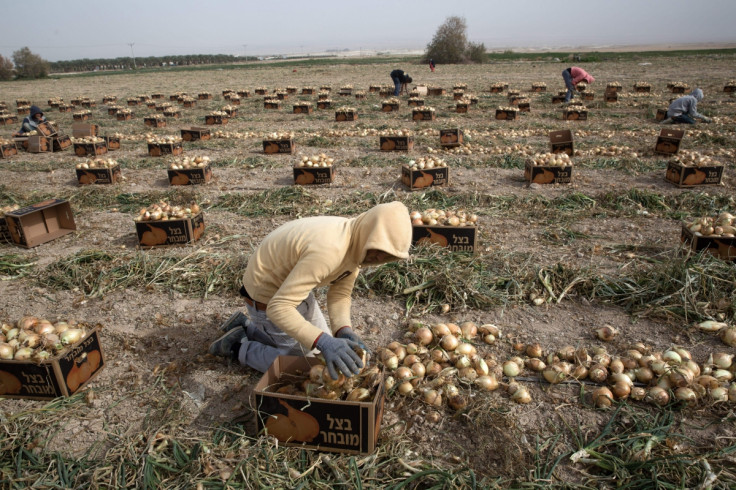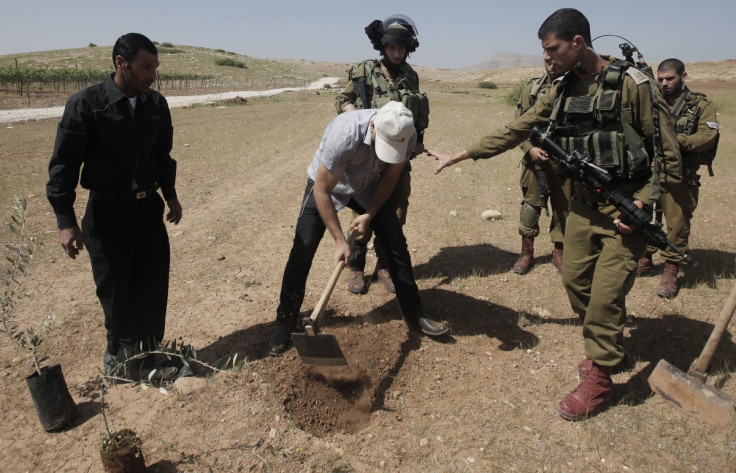Child labour: Palestinian teenagers 'work for $18 per day' on Israeli settlements

Yazan speaks slowly and in short bursts at first. Sitting in a bleak and tiny one-room apartment in the impoverished Palestinian village of Fasayll, in the West Bank's Jordan Valley, the 15-year-old begins to talk about his work.
"I pick sweet peppers," Yazan says shyly. "The work is hard. I'm bending all the time, picking, carrying big boxes to put on the tractor."
Despite his young age Yazan has already been working full-time for a year – he started work when he turned 14 and works five days a week, eight hours a day, carrying out the back-breaking work. The farm the child works on is part of the Israeli settlement of Tomer, a mass of pristine red-tiled homes and lush green farms accompanied by row upon row of polytunnels.
Tomer's neighbouring town – Yazan's hometown of Fasayll – could not be more different. The teenager is one of hundreds of Palestinian child workers – some as young as 11 – employed in the Israeli settlements in the West Bank deemed illegal worldwide.
"There are younger children than me working on the farm," Yazan says when asked about the other people he works with. "Around twenty are younger than me, and there are many that are my age."
Hard labour, long tiring days, and a climate of fear where the farm's boss – an Israeli settler from Tomer – screams at the workers, curses their religion, and regularly threatens dismissal, makes up Yazan's daily routine.
A group representing Israeli farmers, the Moshavim Movement, did not respond to requests to comment on the use of child labour in settlement farms. The Israeli government also declined to provide a statement on the issue after multiple attempts requesting comment.
"The settler doesn't care who is there, if it's a child or an adult," Hamza Zbeidat, the project coordinator in the Jordan Valley for MA'AN, an organisation documenting child labourers in the settlements, says. "What he does care about is the numbers at the end of the day. How many workers were there, and what time did they finish."
They [settler employers] don't care about our salaries, do you think they will care about our age?
According to international, Israeli, and Palestinian law, employment of any child aged 14 or under is prohibited. A child aged 15 can be employed as long as the work will not harm the child's health and well-being. Yazan, who is a full-time employee and whose health continues to suffer as a result of the hard labour, says he feels he has no choice but to continue tilling the fields in order to provide an income for his family.
The occupation of the West Bank, and the designation of 90% of the Jordan valley as Area C – an area controlled solely by the Israeli military – has resulted in much of the land being annexed for Israeli settlements, or for military and firing zones: areas which Palestinian farmers or shepherds are forbidden to use.
The traditional farming livelihood of many families has been lost, resulting in a crippling economic situation. The settlements however, and their farms, have expanded in comparison. They have also benefited from a large reserve of unemployed and cheap Palestinian labourers, some of them children who can be seen throughout the settlement farms carrying out jobs like picking, packaging, and cleaning crops such as dates, sweet peppers, tomatoes and onions.
Conditions are often hazardous, with the use of pesticides and machinery without proper training and safety equipment. Carrying heavy loads is common, while Human Rights Watch documented in a report last year that along with harmful working conditions for child workers, some children had to find their way to hospitals, and pay for their own medical treatment, after being injured on settlement farms.
Since starting work, Yazan has been paid a daily wage of 70 NIS ($18) a day, 8.8 NIS ($2.25) an hour. Under Israeli law, the minimum wage – the least amount any employer can pay per hour – stands at 25 NIS ($6.40). For an 8-hour day this works out at 200 NIS ($51.2) – 130 NIS ($33.2) more than what Yazan makes.
"They [settler employers] don't care about our salaries, do you think they will care about our age?" Yazan asks rhetorically. "They don't care about rights."
For children working in the Israeli settlements in the Jordan Valley, the day is a long and tiring one. Waking up at 4 or 5am, they walk to the entrance of the settlement farms where they are then picked up in tractors. During the summer the midday temperature is often over 40 Celsius and in the polytunnels can reach 50. The stifling heat and gruelling work has resulted in children becoming ill and fainting while working.
Driving through the Jordan Valley, large polytunnels filled with crops sit beside rows of date trees. The agricultural land often gives way to large areas of barren land – designated military zones – beside them, sat against the hills of the valley, are small cramped grey masses of homes, Palestinian villages.
Unable to build outwards, or create small farms or businesses on the land – the Israeli army accepts less than 2% of all building permits from Palestinians living in Area C – these small communities have become dependent on settlement work.
"Children are everywhere in the farms," Zbeidat says. "The settler asks a Palestinian middleman to bring him workers, but they don't care about the age and they don't ask. They know that some of the workers are children though."

One prominent Israeli farmer from Tomer settlement, Shaul Avital – who Palestinian residents of Faysall said employed children – denied the accusation.
"There is nothing like this," Avital denied in response to whether he or other farmers were employing Palestinian children. "I don't know it and I don't know anyone that does it."
Early in 2015, a 74-page report by Human Rights Watch brought the issue to the fore. Although Avital denies Palestinian children work in the farms, they can be seen frequently toiling the fields and working in the polytunnels of settler farms on either side of the main road that splits the Jordan Valley in two – Highway 90.
Mohammed, a 14-year-old who has autism, works on a settlement farm in the area. His sandals are worn, the edges frayed, and his feet still covered in mud from a day's shovelling dirt.
"Going to school would be easier," the 14-year-old says when asked about the four-days work a week he does. "But there's no money in school," he continues.
The sentiments in the Jordan Valley is that while Palestinian families have suffered, Israeli settlers have benefited – including through gaining a cheap source of labour from an impoverished Palestinian population plagued with high unemployment and limited sources of income.
"He shouts, he comes sometimes just to shout at the work I'm doing," Mohammed says when asked about his employer. "Sometimes he fires other workers. It scares me."
Like Mohammed and Yazan, at the age of 14 many children in rural villages such as Fasayll, al-Jiflik, and al-Zbuaidat, have begun dropping out of school to help their families get by financially.
"I don't have a choice but to work there, I have to because of the economic situation," Yazan explains looking downwards as he speaks. He wants to become a policeman, but says he does not see a future past toiling the soil on settlement farms.
"If they [the settlers] were not here, we would be allowed on the land, own the land and cultivate it, and make an income," Yazan states. "I wouldn't have to work where someone is shouting at me all the time."
© Copyright IBTimes 2025. All rights reserved.





















